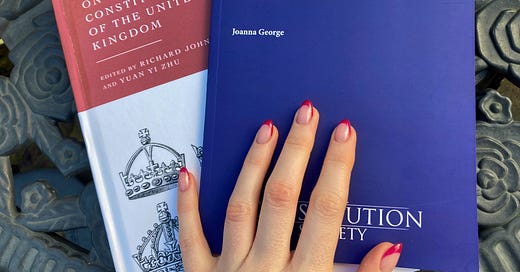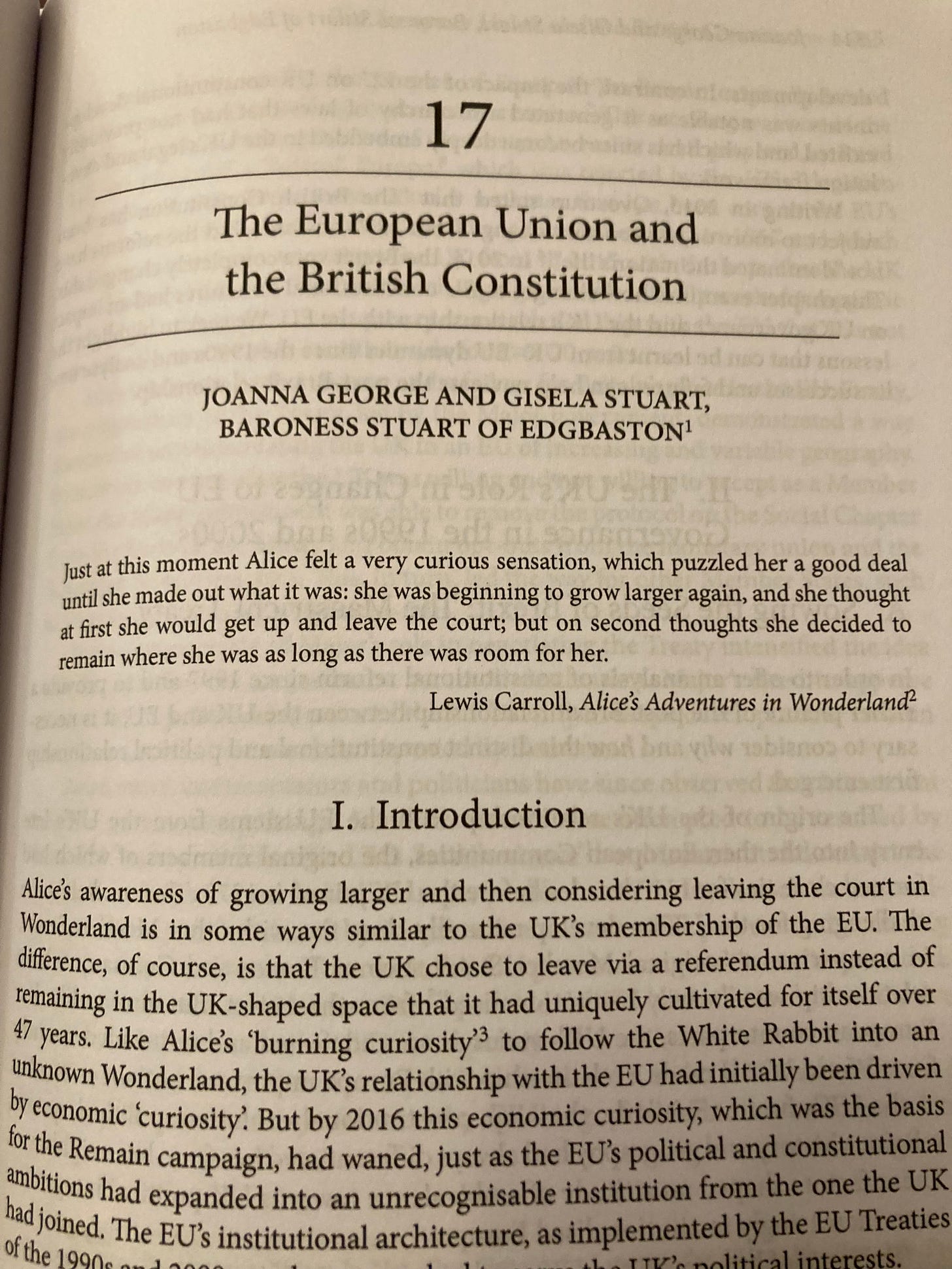“What wisdom did you gain this year?” is a question many of us are asking, or have been asked, as 2023 comes to a close. Having assessed my own wins, losses and wisdom scorecard for the year, the one that I’m keen to share with you as the reader of my writing is the wisdom and learning I gained from the words I’ve been writing, both here and elsewhere.
2023 was a wild writing year for me in terms of the diversity of topics I’ve been writing about and have had published. The first half of the year saw two academic publications I had been working on at the latter end of 2022 as part of my academic law work at Cambridge University see the light of day. The second half of 2023 saw the emergence of my more creative and free-flowing writing which you can read here in The Breakout Room.
The contrast between my academic writing and my writing here in The Breakout Room couldn’t be more different. Yet the creation of The Breakout Room was always going to be an inevitable follow up to an intense period of academic work. As someone who has an eclectic interest in academia, creative work, and entrepreneurship, too much of one thing leaves me lacking and longing for the others. In this sense, The Breakout Room has been a creative restorer. I’ll be embracing much more of it in 2024.
Whilst what I have been writing about has been different in terms of topic and style, the reason why I’ve been writing remains the same – to educate, to inform, to make people think, to express my own mind and to be creative. I take all aspects of my work seriously – from the logical and academic to the intuitive and creative. I also take my curiosity very seriously, and I don’t resist what wants to flow my way. 2023 was the year where I professionally leaned into my creativity more and became more visible and vocal about it, not only for my sense of purpose and enjoyment but for others to benefit from. 2023 was the year I started it. I hope 2024 will reveal its impact.
Academic publications
My academic work this year was challenging, intense, but ultimately rewarding. I learnt a lot, not only in terms of legal and historical knowledge, but also about the human aspect of political decision-making, the people responsible for it and why and how they make those decisions (I’ll be writing about this here at a later date). The topics were as complex as they were politically prickly.
My book chapter with Baroness Gisela Stuart on the UK’s relationship with the EU leading up to Brexit, and my report on the controversial Bill of Rights Bill that had initially been proposed by the UK Government then dropped (Amen to that) were published to good reception. The book chapter (and the rest of the book, I should add!) was one of The Times’ best legal books for summer 2023, so that was kind of cool.
Couldn’t resist adding in Alice to my book chapter on the UK’s relationship with the EU.
I am forever grateful to Gisela for trusting me to co-author this book chapter with her. Gisela’s knowledge and experience on EU matters – from being involved in the draft treaty establishing a constitution for Europe in the early 2000s to her experience as a Labour MP leading up to the Brexit referendum and then chairing the Vote Leave campaign – is unparalleled. I would not have written this book chapter with anyone else.
Writing history for an academic publisher is one thing. But co-authoring history with a person who contributed towards the very history you are writing about is another thing entirely. Whilst I have always been vocal about the importance of words and how they shape lives and events, this book chapter taught me the significance of responsibility as a public historian (something which Anton Howes writes about here) and choosing your words and sources with care. Another thing that the book chapter made me think deeply about was who gets to write history and why – whose perspectives are included, and whose aren’t? And why is this? Why do some people gravitate towards some historians and not others? Diverse perspectives across all aspects of history are a no-brainer if we want to gain more insight and understanding of different historical periods.
The topic of Brexit and the UK’s relationship with the EU still remains an uncomfortable and “I’d rather avoid it” topic for many, and my intention to explore and explain this topic so that it would be accessible and readable to as many people as possible (despite being an academic publication) was very important to me from the outset. I also wanted it to be nuanced – because how could it not be? – so I was delighted to read David Klemperer’s review of the book which used this word to describe Gisela and I’s contribution.
An interesting side note. On the day of the Brexit referendum result I vividly remember walking to the tube station in central London and on my way there I recall looking to my left to cross the road, and who did I see but a very happy looking Gisela Stuart sitting in the front passenger seat of a Vote Leave van. I then met Gisela a few months later through a constitutional project. The rest is literally history. And yes, I can confirm that the Universe does indeed work in mysterious ways ✨
Meanwhile, my paper on the UK Government’s Bill of Rights Bill came to the conclusion that this supposedly “modern” (lol!) Bill of Rights Bill was a fine example of contradictory constitutionalism. Essentially, the authors of the Bill had completely taken the power out of the policy and law they were trying to propose through the language and choice of words they had not-so-thoughtfully chosen. It didn’t even have in mind who it was for and why. Rather, it concentrated on who it was not for. Weird.
The wisdom I gained from writing this report and associated blog pieces was how not to write law. The Bill was so poorly constructed and conducted that it felt like going through a badly written student essay and highlighting what you should not do. It was a strange piece of legislation to write about and I’m not sure how the Conservative Party can seriously come back to this issue in the future. Thankfully, the UK Government has dropped it (or in the words of The Law Society Gazette, the Bill has been “officially killed off”). Criticisms aside, my report did put forward some helpful suggestions for a modern (yes, modern for the 21st century) British Bill of Rights that would help people, not legally hinder them. Happy to contribute towards this the day it decides to come about.
Wisdom I’ve gained from my academic writing in 2023:
History and the meaning we gain from it is everything. History can change and shape the future for the better if we pay attention to the details (both big and small) and the diverse perspectives of the past. Every modern political leader should have a historian they can turn for any given topic. Everyone should be mindful of the significance that history can provide to humanity. History will repeat itself until we learn from it.
We need political leaders who are both intellectually and emotionally intelligent. Intellectual intelligence without emotional understanding or awareness leads to words and actions without power.
Small and seemingly insignificant details and facts are extremely important. They either add to your writing/text or diminish it. Every sentence needs to serve a purpose.
Intention is the portal to powerful and collaborative creation. Without a clear compass and intention, no politician can make beneficial laws that people will support.
Political language in the UK is becoming increasingly confusing and contradictory and reduces trust with voters. It also prevents the creation of positive political change and impact.
The Breakout Room – and the story so far
This piece marks my tenth publication on Substack and I have written over 10,000 words. Wow! When I started The Breakout Room back in September 2023, I was unsure what it would become, what people would make of it, whether I would regularly show up, write and post on it, or if anyone would sign up to it. I started this Substack for the reasons I outlined here, but reflecting a few months on, I realise that I badly needed to create something totally new, and that it was long overdue. Up to that point, I was mentally steeped in academic/policy work, which as outlined above, you can imagine to be pretty intense and at times, depressing to write about when you realise that a lot of problems in the democracy and political space are actually preventable if greater discernment, logic and emotional intelligence were embraced. This writing space of my own on Substack has revitalised my interest in writing.
So far, I haven’t written very much on topics that I’m academically known for, but that’s why I’ve really appreciated it. I’ve previously written articles for publications like British Vogue and The Times, and this space on Substack has enabled me to consistently take whatever topic that interests me and write about it without any editorial restraints.
Unlike my academic writing, my writing on Substack is more intuitive, creative and playful. Writing from this energy and perspective, I feel like I’ve gained greater wisdom and insight on a wider variety of topics, from Nick Cave and the Nuanced Nature of ChatGPT to Main Character Energy to The Meaning We Give to Money. Most importantly, this kind of writing has been lifegiving, and I don’t use that word lightly. It’s an energy that I want my work and writing to revolve around in 2024 and beyond. Whilst The Breakout Room is still quite young, here is what I have learnt so far.
Wisdom I’ve gained from The Breakout Room in 2023:
Write about things that you want to write about, which lights you up and which give you energy. If readers like it that’s great but creating for the sake of enjoyment is a good enough reason. Creating joy is a powerful energy to have, and to be around.
My favourite readers are the ones who not only read my words but are receiving what I am trying to say and understand how it applies to them. It’s a subtle but significant difference.
All my different writing and professional personas were worth going through to get to this point in my writing journey. No writing experience is ever wasted.
Short sentences are worth the effort (thanks Jonny).
I’m more obsessed with musicians than I realised.
What have you gained from my writing this year? I would love to know! If you are keen to becoming a paying subscriber for 2024, sign up below.






